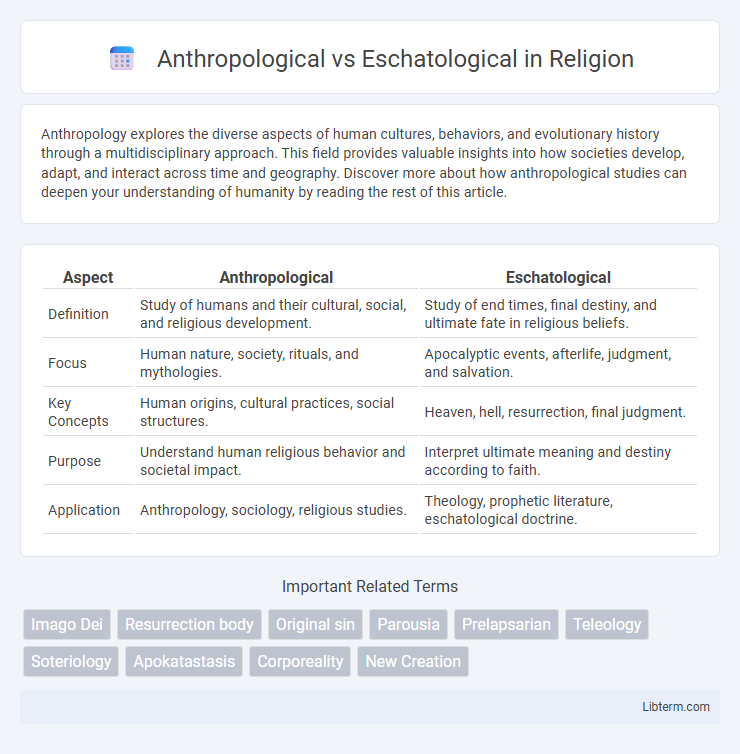Anthropology explores the diverse aspects of human cultures, behaviors, and evolutionary history through a multidisciplinary approach. This field provides valuable insights into how societies develop, adapt, and interact across time and geography. Discover more about how anthropological studies can deepen your understanding of humanity by reading the rest of this article.
Table of Comparison
| Aspect | Anthropological | Eschatological |
|---|---|---|
| Definition | Study of humans and their cultural, social, and religious development. | Study of end times, final destiny, and ultimate fate in religious beliefs. |
| Focus | Human nature, society, rituals, and mythologies. | Apocalyptic events, afterlife, judgment, and salvation. |
| Key Concepts | Human origins, cultural practices, social structures. | Heaven, hell, resurrection, final judgment. |
| Purpose | Understand human religious behavior and societal impact. | Interpret ultimate meaning and destiny according to faith. |
| Application | Anthropology, sociology, religious studies. | Theology, prophetic literature, eschatological doctrine. |
Understanding Anthropological Perspectives
Anthropological perspectives emphasize the study of human cultures, behaviors, and social structures to understand the diversity and commonalities of human experiences. These perspectives investigate how societies develop beliefs, values, and customs based on historical, environmental, and biological factors. In contrast, eschatological views center on beliefs about the ultimate destiny of humanity and the world, often rooted in religious or philosophical frameworks.
Defining Eschatological Concepts
Eschatological concepts explore the ultimate fate of humanity and the world, encompassing themes of judgment, afterlife, and cosmic renewal, contrasting with anthropological views that center on human nature and cultural development. Key eschatological elements include apocalyptic visions, messianic expectations, and the notion of final salvation or condemnation as seen in religious texts like the Book of Revelation. Understanding eschatology involves analyzing how different traditions interpret the end times and the consequences for existence beyond mortal life.
Historical Roots of Anthropology and Eschatology
Anthropology finds its historical roots in the ancient Greek tradition of studying humanity through cultural, social, and biological perspectives, evolving into a scientific discipline during the Enlightenment. Eschatology originates from religious and philosophical traditions, particularly within Jewish, Christian, and Islamic teachings, focusing on the ultimate destiny of humanity and the universe. While anthropology emphasizes empirical investigation of human societies across time, eschatology investigates prophetic and metaphysical narratives about the end times and final judgment.
Core Differences: Human Nature vs Ultimate Destiny
Anthropological perspectives primarily analyze human nature, exploring origins, behaviors, and cultural development as central themes in understanding humanity. Eschatological views, in contrast, focus on ultimate destiny, addressing concepts of final judgment, the afterlife, and the fate of the soul or universe. These core differences highlight anthropology's emphasis on present human existence versus eschatology's concern with future existential outcomes.
Anthropological Approaches in World Religions
Anthropological approaches in world religions examine human beliefs, practices, and cultural contexts to understand how religions shape and reflect human experiences and social structures. These approaches prioritize the study of rituals, myths, and symbols as expressions of collective identity and existential meaning within specific communities. By analyzing religion through anthropological methods, scholars reveal how diverse religious traditions address fundamental human concerns such as life, death, morality, and social cohesion.
Eschatological Narratives Across Cultures
Eschatological narratives across cultures reveal diverse beliefs about the end of the world, including concepts like Ragnarok in Norse mythology, the Day of Judgment in Islamic and Christian traditions, and the cyclical destruction and rebirth in Hindu cosmology. These narratives reflect existential concerns and moral frameworks that shape cultural identities and influence human behavior. Understanding these eschatological frameworks highlights universal themes of renewal, justice, and cosmic order amid cultural differences.
Intersection of Anthropology and Eschatology
The intersection of anthropology and eschatology examines human nature and destiny through the lens of ultimate realities and final events. Anthropological perspectives explore the essence and purpose of humanity, while eschatological frameworks predict the fulfillment of human existence and cosmic destiny. This synthesis enriches theological and philosophical discourse by linking human identity with the unfolding culmination of history and divine purpose.
Anthropology’s Role in Interpreting Eschatological Beliefs
Anthropology plays a crucial role in interpreting eschatological beliefs by examining how diverse cultures construct and understand end-of-world narratives within their social and religious contexts. Researchers analyze rituals, symbols, and mythologies associated with eschatology to reveal underlying human concerns about mortality, morality, and cosmic order. This approach provides a comprehensive understanding of eschatological concepts as reflections of human experience and cultural adaptation rather than solely theological doctrines.
Contemporary Debates: Anthropology vs Eschatology
Contemporary debates between anthropology and eschatology center on their differing approaches to understanding human existence and destiny, where anthropology emphasizes the study of human cultures, behaviors, and origins, while eschatology focuses on the ultimate fate of humanity and the cosmos. Scholarly discourse often contrasts anthropological methods grounded in empirical research with eschatological interpretations rooted in theological or philosophical frameworks. These debates shape interdisciplinary discussions in fields like religious studies, philosophy, and cultural theory, highlighting tensions between materialist perspectives and metaphysical beliefs about human purpose and final outcomes.
Future Directions in Anthropological and Eschatological Studies
Future directions in anthropological and eschatological studies emphasize interdisciplinary approaches integrating cultural anthropology with theological eschatology to explore human conceptions of the end times. Advances in digital ethnography and archaeological discoveries provide new data to analyze how diverse societies envision and prepare for apocalyptic scenarios. Emerging research prioritizes cross-cultural comparisons and the impact of globalization on evolving eschatological narratives and anthropological interpretations of existential futures.
Anthropological Infographic

 libterm.com
libterm.com